While the threat of being bombed was constant during WWII (see the recent book ‘Pocklington At War’, available from local bookshops for details) the Pocklington area also experienced two bombing raids by German Zeppelins during WWI.
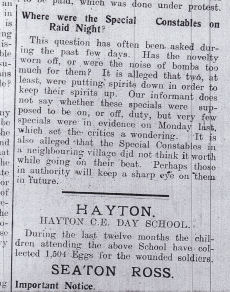 The raids to this area, in 1916 and 1918, were two of some 20 Zeppelin attacks on Yorkshire during WWI which resulted in around 100 fatalities. However, while the two local raids, created considerable fear and concern, on both occasions the Zeppelins dropped their bombs in the countryside and caused limited damage.
The raids to this area, in 1916 and 1918, were two of some 20 Zeppelin attacks on Yorkshire during WWI which resulted in around 100 fatalities. However, while the two local raids, created considerable fear and concern, on both occasions the Zeppelins dropped their bombs in the countryside and caused limited damage.
The news embargo on military events meant that the local paper, The Pocklington Weekly News, was not able to report events. There are numerous articles and letters on what to do in case of an air raid, official brief government press releases from the War Office, and a few bits of ‘additional reporting’ – including a caustic piece about the local Special Constables sitting in the pub instead of protecting the public in 1916.
Britain’s fear of Zeppelins was present right from the outbreak of the war in September 1914. The Pocklington Weekly News reported on 15 January 1915 that Pocklington Urban District Council was to distribute a handbill of advice in the event of an attack from the air. It would include the fact that the gas supply would be cut off at the Pocklington Gas Works. Consumers were to be advised to turn off gas taps and to take refuge on the lower floors or cellar; lights were to be shaded.
Of the two raids, events of 1916 appear to be best known, both through written sources and memories handed down locally.
The first time a Zeppelin alert was raised was in September 1916 when there were raids over Yorkshire on 2/3 September and 25/26 September. The first dropped a few bombs in Holderness then flew off, but the second attack involving four Zeppelins was more extensive and bombing included York and Sheffield, where 23 people were killed.
This attack passed over Pocklington and the Pocklington School magazine phlegmatically reported "The election of a new Sergeant-at-Arms was interrupted by a sudden extinction of the lights, denoting Teutonic presences in the air" (the school established its Cadet Force in 1916).
The concerns over the safety of York, where nine people had been killed by a bombing raid in May 1916, resulted in further safety measures, which appear to have successfully drawn fire away from the city, but also put the Pocklington area under increased threat.
A Pocklington School publication again provides the most comprehensive description, saying: “It is strange to remember the threatening hum of the comparatively slow airship, faintly seen above like a colossal cigar, avoiding moonlit nights and cruising about to find a well-lighted town. Decoys were lit and a fire purposely made on Barmby Common saved York Minster but caused the demolition of a pig-sty. The airship’s engines so alarmed the Pocklington townsfolk that they sent a message to the headmaster asking him to quieten the boy’s voices for fear they should guide the Zeppelin crew into dropping their load.”
Pocklington’s one-legged town crier, Peter Harrison, recalled having to go about the town to call out the immediate approach of the Zeppelins. He added that it was a Sunday and the only time he called a message on the Sabbath in his many decades as town crier. In the days before TV or radio, the town crier was the main source of public information.
The raid was by a fleet of nine Zeppelins. Five attacked Yorkshire and four headed for the North-East, where one was shot down over Hartlepool. The success of the local decoy tactics was shown by the Zeppelin L13 dropping 24 bombs in the open countryside outside Barmby Moor, before the captain realised the ruse and headed for York to drop 23 more bombs, though with little effect.
Local legend differs slightly from the Pocklington School account. Ray Wilkinson, from Barmby Moor, still recalls what he was told by his father, who witnessed the event, saying that the only significant damage was the destruction of a shed used by the family horse, which had luckily strayed outside a short time before.
The Zeppelin raids early in the war saw both anti-aircraft artillery defences and Royal Flying Corp being set up to project Yorkshire’s cities and industrial installations. The early airstrips were often the county’s race courses, but included in 1916 an airstrip being built in a field between Pocklington and Barmby Moor for BE2c aeroplanes (pictured below), which needed only 200 yards to take off. The 33 Squadron operated its BE2c’s at night looking for airships. However, no Zeppelins were shot down over Yorkshire (initially the BE2c bullets would have gone harmlessly straight through them, so new ammunition had to be developed), and the Hartlepool success was the only one in the North.
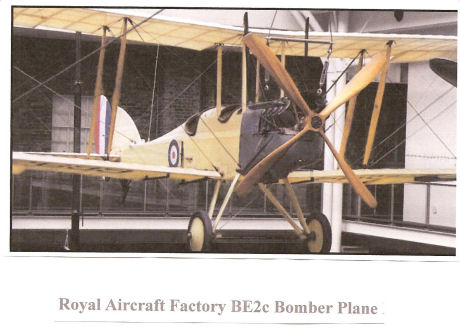
It was some 16 months before the Pocklington area was directly affected again, and once more the Zeppelin bombs failed to hit a major target. The 1918 raid on 12/13 March was the last major significant on Yorkshire. It was planned to attack Leeds, but heavy cloud and faulty navigation saw the L61 and L62 Zeppelins instead drop their bombs on Hull and near Pocklington.
Information and local legend is even more scarce, but a brief War Office press release was carried in the Pocklington Weekly News telling of the raid on Hull and East Yorkshire countryside. The Pocklington paper also informed of ten bombs falling locally including one in a field in front of a nearby village pub.
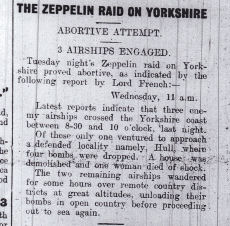
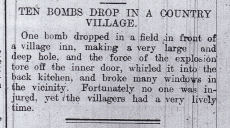
The L61 and L62 Zeppelins that attacked Pocklington in March 1918
The L61 Zeppelin & its captain

The L62 Zeppelin Technical Information:
Length 195.6 metres,
Diameter 23.9 metres
Gas capacity 56,000 cubic metres
Performance 32 Metres per Second,
Range 13,500 Km
Payload 40.0 tonnes of 4,500 kg bombs
Engines 5 x Mercedes Benz 4a (240 hp)
Built Lowenthal, First flight 19.01.1918,
Base Nordholz
Total 19 flights (6,463 km)
2 reconnaisance missions and 2 raids.
Destroyed by fire over Heligoland, no survivors. Though there is considerable doubt about the accuracy of both incidents, it has been claimed that the L62 shot down a British aeroplane over Coventry during its next raid on the Midlands in April 1918. It is also claimed that the L62 bursting into flames over Heligoland (an island 30 miles off the coast of Germany) the following month in May 1918 was the result of being hit by a British plane.
Addendum:
An interesting local postcard was found giving an eye witness account of Zeppelins passing over Market Weighton
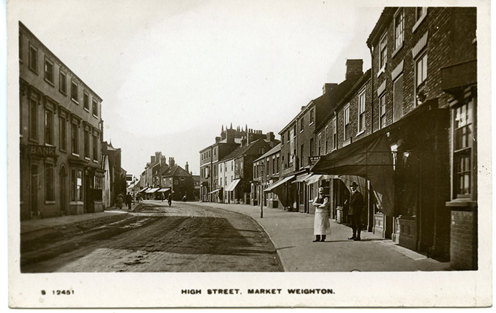
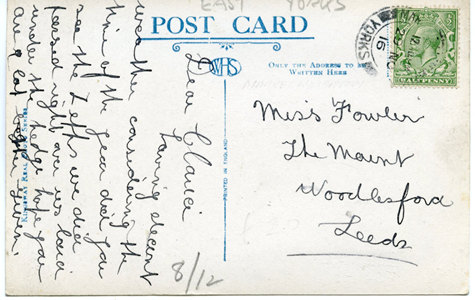
29th November 1916
Dear Clarice
Having decent weather considering the time of year did you see the Zepps we did passed right over us laid under the hedge hope you are a lot better given.

